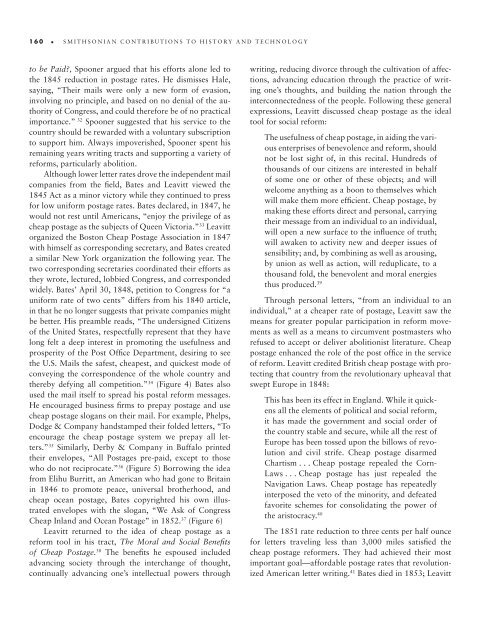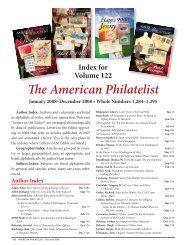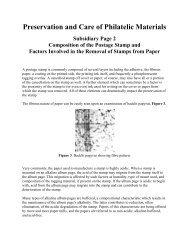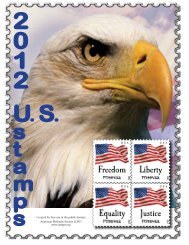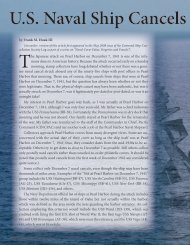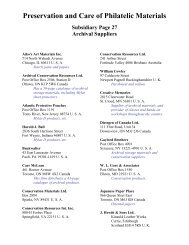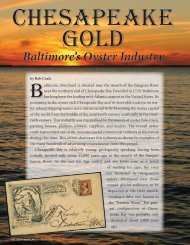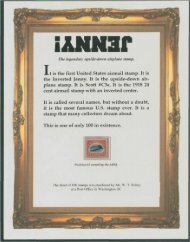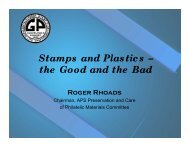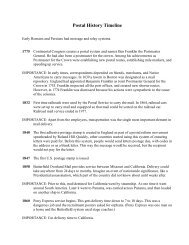The Winton M. Blount Postal History Symposia - Smithsonian ...
The Winton M. Blount Postal History Symposia - Smithsonian ...
The Winton M. Blount Postal History Symposia - Smithsonian ...
- No tags were found...
Create successful ePaper yourself
Turn your PDF publications into a flip-book with our unique Google optimized e-Paper software.
1 6 0 • s m i t h s o n i a n c o n t r i b u t i o n s t o h i s t o ry a n d t e c h n o l o g yto be Paid?, Spooner argued that his efforts alone led tothe 1845 reduction in postage rates. He dismisses Hale,saying, “<strong>The</strong>ir mails were only a new form of evasion,involving no principle, and based on no denial of the authorityof Congress, and could therefore be of no practicalimportance.” 32 Spooner suggested that his service to thecountry should be rewarded with a voluntary subscriptionto support him. Always impoverished, Spooner spent hisremaining years writing tracts and supporting a variety ofreforms, particularly abolition.Although lower letter rates drove the independent mailcompanies from the field, Bates and Leavitt viewed the1845 Act as a minor victory while they continued to pressfor low uniform postage rates. Bates declared, in 1847, hewould not rest until Americans, “enjoy the privilege of ascheap postage as the subjects of Queen Victoria.” 33 Leavittorganized the Boston Cheap Postage Association in 1847with himself as corresponding secretary, and Bates createda similar New York organization the following year. <strong>The</strong>two corresponding secretaries coordinated their efforts asthey wrote, lectured, lobbied Congress, and correspondedwidely. Bates’ April 30, 1848, petition to Congress for “auniform rate of two cents” differs from his 1840 article,in that he no longer suggests that private companies mightbe better. His preamble reads, “<strong>The</strong> undersigned Citizensof the United States, respectfully represent that they havelong felt a deep interest in promoting the usefulness andprosperity of the Post Office Department, desiring to seethe U.S. Mails the safest, cheapest, and quickest mode ofconveying the correspondence of the whole country andthereby defying all competition.” 34 (Figure 4) Bates alsoused the mail itself to spread his postal reform messages.He encouraged business firms to prepay postage and usecheap postage slogans on their mail. For example, Phelps,Dodge & Company handstamped their folded letters, “Toencourage the cheap postage system we prepay all letters.”35 Similarly, Derby & Company in Buffalo printedtheir envelopes, “All Postages pre- paid, except to thosewho do not reciprocate.” 36 (Figure 5) Borrowing the ideafrom Elihu Burritt, an American who had gone to Britainin 1846 to promote peace, universal brotherhood, andcheap ocean postage, Bates copyrighted his own illustratedenvelopes with the slogan, “We Ask of CongressCheap Inland and Ocean Postage” in 1852. 37 (Figure 6)Leavitt returned to the idea of cheap postage as areform tool in his tract, <strong>The</strong> Moral and Social Benefitsof Cheap Postage. 38 <strong>The</strong> benefits he espoused includedadvancing society through the interchange of thought,continually advancing one’s intellectual powers throughwriting, reducing divorce through the cultivation of affections,advancing education through the practice of writingone’s thoughts, and building the nation through theinterconnectedness of the people. Following these generalexpressions, Leavitt discussed cheap postage as the idealtool for social reform:<strong>The</strong> usefulness of cheap postage, in aiding the variousenterprises of benevolence and reform, shouldnot be lost sight of, in this recital. Hundreds ofthousands of our citizens are interested in behalfof some one or other of these objects; and willwelcome anything as a boon to themselves whichwill make them more efficient. Cheap postage, bymaking these efforts direct and personal, carryingtheir message from an individual to an individual,will open a new surface to the influence of truth;will awaken to activity new and deeper issues ofsensibility; and, by combining as well as arousing,by union as well as action, will reduplicate, to athousand fold, the benevolent and moral energiesthus produced. 39Through personal letters, “from an individual to anindividual,” at a cheaper rate of postage, Leavitt saw themeans for greater popular participation in reform movementsas well as a means to circumvent postmasters whorefused to accept or deliver abolitionist literature. Cheappostage enhanced the role of the post office in the serviceof reform. Leavitt credited British cheap postage with protectingthat country from the revolutionary upheaval thatswept Europe in 1848:This has been its effect in England. While it quickensall the elements of political and social reform,it has made the government and social order ofthe country stable and secure, while all the rest ofEurope has been tossed upon the billows of revolutionand civil strife. Cheap postage disarmedChartism . . . Cheap postage repealed the Corn-Laws . . . Cheap postage has just repealed theNavigation Laws. Cheap postage has repeatedlyinterposed the veto of the minority, and defeatedfavorite schemes for consolidating the power ofthe aristocracy. 40<strong>The</strong> 1851 rate reduction to three cents per half ouncefor letters traveling less than 3,000 miles satisfied thecheap postage reformers. <strong>The</strong>y had achieved their mostimportant goal—affordable postage rates that revolutionizedAmerican letter writing. 41 Bates died in 1853; Leavitt


